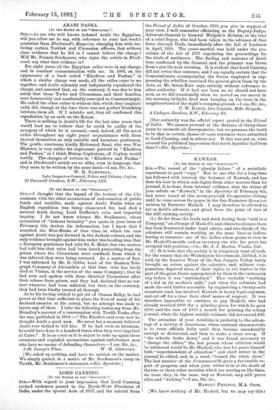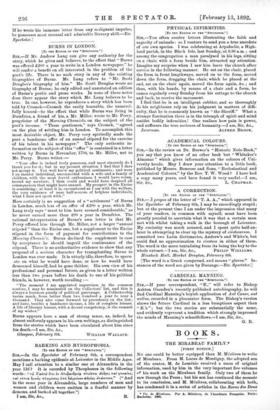KAWEAH.
[To THE EDITOR 07 THE " SPECTATOE."1 SIR,—The record of the "ghastly failure" of a socialistic experiment is good "copy." But to one who for a long time has followed with interest the fortunes of Kaweah, and has done his best to obtain side-lights from other sources than its journal, it is clear, from internal evidence, that the writer of your article on " Kaweah," in the Spectator of February 6th, had never heard of this seven-year-old Co-operative Colony until he came across the paper in the San Francisco Examiner written by Barnette Haskell. I may therefore be allowed to act as devil's advocate, and plead from the point of view of the still existing society.
(1.) So far from the lands and stock having been " sold to a Company," an attempt of Haskell's and others to alienate them has been frustrated under legal advice, and two-thirds of the colonists still remain, working on the same lines as before, having as treasurer one of the ladies whose praise is even in Mr. Haskell's mouth, and as secretary one who for years has occupied this position,—viz., Mr. J. J. Martin, Visalia, Cal.
(2.) It is true that the society is in temporary want of cash, for the reason that the Washington Government, lobbied, it is said, by the Lumber Trust of the San Joaquin Valley, lately brought an action against the colonists, and, without com- pensation, deprived them of their rights to cut timber in the part of the great forest appropriated by them in the customary way before it was "nationalised." This veritable "seething of a kid in its mother's milk," just when the colonists had made the said timber accessible by engineering a twenty-mile mountain road, has involved Kaweah in heavy legal expenses, and cut off for a time their chief means of support. It was therefore impossible to continue to pay Haskell, who had already received £800 for a printing-press for which he gave £500, and the sum of £150 a month for printing the colony journal, when the highest outside estimate did not exceed £90.
The ostracism of your Aristides is probably to the advan- tage of a society of Americans, whose national characteristic is to trust officials folly until they become unendurably corrupt or dictatorial, and then to make a clean sweep. If " the schools broke down," and it was found necessary to " change the editor," the last person whose criticism would be unbiassed would be Mr. Haskell, who was for years himself both "superintendent of education" and chief writer in the journal he edited, and, in a word, "bossed the whole show." The last number of the Commonwealth gives a favourable re- port of progress, and when your writer is in at the death of the two or three other societies which are moving on like lines, we trust they, in the same way as Kaweah, may still prove alive and " kicking."—I am, Sir, dec., HAMLET PHILPOT, A.L.A. Oxon.
[We know nothing of Mr. Haskell, but we may say this : If he wrote his immense letter from any malignant impulse, be possesses most unusual ani admirab'e literary skill.—ED. Spectator.]



































 Previous page
Previous page